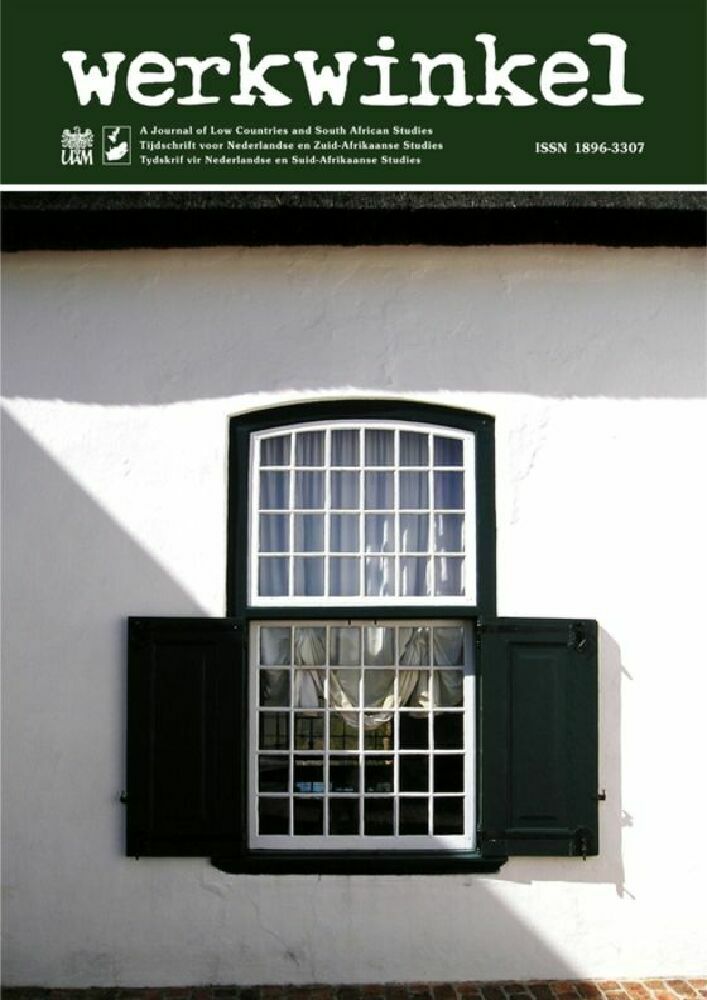Abstract
Two hypotheses on identity lay at the core of this paper. (1) Doeschka Meijsing presents identity as unstable and as a construct of one’s own in three novels. (2) Meijsing uses memory discourses and cultural phenomena to display how characters struggle when (re-)constructing their identities. Pip (Over de liefde, 2008), has to deal with the secret affair of her female lover who has got pregnant. She refuses to be the ‘left one’ everyone feels pity for. As a result, she has to create a new identity that doesn’t fit the expectations of others. In 100% Chemie (2002), an unnamed daughter of a German migrant and Dutch father grew up in the Netherlands. As she doesn’t identify with any nationality she seeks to stabilize her fragmented identity. Investigating the history of her German family she tries to create her own identity. Robert Martin, main character of De tweede man (2000), struggles with the legacy of his brother Alexander who has passed away. Robert has not only inherited his brother’s fortune but also his friends. They want Robert to replace Alexander. Robert has to create a new identity which fits their lifestyle. Meijsing’s characters feel as if they have ‘lost’ their identities, as far as they ‘owned’ ones. As a result, their stories stress views on identity: do they have fixed identities, which can be destroyed? Is identity a construction and if so, how can it be created? I discuss how cultural memory, especially counter-memory which questions memory discourses, impacts the construction of identity. Furthermore, I show how intersections of identity categories trouble Meijsing’s characters.
References
Assmann, Aleida. 2014. “Soziales und kollektives Gedächtnis.” Onlineresource der Bundeszentrale für politische Bildung. 15 Jan. 2015. .
Assmann, Jan. 1992. Das kulturelle Gedächtnis. Schrift, Erinnerung und politische Identität in frühen Hochkulturen. München: Beck.
Bal, Mieke. 1999. “Introduction.” Acts of Memory: Cultural Recall in the Present. Eds Mieke Bal, en John Crewe. Hannover: NH, UPof New England. vii-xvii.
Bal, Mieke. 2002. Travelling Concepts in the Humanities: A Rough Guide. Toronto: University of Toronto Press.
Bax, Sander. 2009. “Op deze plaats geef ik je vrede. Over Over de liefde van Doeschka Meijsing.” Jan Campert-prijzen 2008. Nijmegen: Uitgeverij Vantilt. 81-117.
Brah, Avtar, en Ann Phoenix. 2004. “Ain‘t Ia Women? Revisiting Intersectionality.” Journal of International Women Studies 5(1): 75-86.
Erll, Astrid. 2011. Kollektives Gedächtnis and Erinnerungskulturen. Eine Einführung. Stuttgart: J.B. Metzler.
Fortunati, Vita, en Elena Lamberti. 2008. “Cultural Memory: A European Perspective.” Media and Cultural Memory/ Medien and kulturelle Erinnerung. Eds Ansgar Nunning, en Astrid Erll. Berlin: Walter de Gruyter Gmb Hand Co. KG. 127-137.
Halbwachs, Maurice. 1991[1985]. Das kollektive Gedächtnis. Frankfurt am Main: Fischer.
Lykke, Nina. 2010. Feminist Studies. A Guide to Intersectional Theory, Methodology and Writing. New York: Routledge.
Mc Adams, Dan P. 2011. “Narrative Identity.” Handbook of Identity Theory and Research. Eds Seth J. Schwartz, Koen Luyckx, en Vivian Vignoles. Band I. New York: Springer. 99-115.
Medina, José. 2011. “Towarda Foucaultian Epistemology of Resistance: Counter-Memory, Epistemic Friction, and Guerrilla Pluralism.” Foucault Studies 12: 9-35.
Meijer, Maaike. 1996. In tekst gevat. Inleiding tot een kritiek van representatie. Amsterdam: Amsterdam University Press.
Meijsing, Doeschka. 2000. De tweede man. Amsterdam: Querido.
Meijsing, Doeschka. 2002. 100% Chemie. Amsterdam: Querido.
Meijsing, Doeschka. 2008. Over de liefde. Amsterdam: Querido.
Meijsing, Doeschka. 2016. En liefde in mindere mate. Dagboeken 1961-1987. Eds. Ben Peperkamp, en Annette Portegies. Amsterdam: De Arbeiderspers.
Morrison, Toni. 1992. Playing in the Dark: Whiteness and the Literary Imagination. Cambridge: Harvard University Press.
Neumann, Birgit. 2005. Erinnerung-Identität-Narration. Gattungstypologie and Funktionen kanadischer fictions of memory. Berlin/New York: Walter de Gruyter Gmb Hen Co. KG.
Nora, Pierre. 1989. “Between Memory and History: Les lieux de memoire.” Representations 26: 7-25.
Paardt, Rudi van der. 2010. “Doeschka Meijsing. De tweede man.” Lexicon van literaire werken. Besprekingen van Nederlandstalige werken 1900-heden. Eds. A.G.H. Anbeek van der Meijden, Jaap Goedegebuure, en M. Janssens. Groningen: Wolters-Noordhoff. 1-10.
Pattynama, Pamela. 2012. “Cultural Memory and Indo-Dutch Identity Formations.” Post-Colonial Immigrants and Identity Formations in the Netherlands. Ed. Ulbe Bosma. Amsterdam: Amsterdam University Press. 175-192.
Pattynama, Pamela. 2014. Bitterzoet Indië. Herinnering en nostalgie literatuur, foto‘s en films. Amsterdam: Prometheus Bert Bakker.
Plate, Liedeke, en Anneke Smelik. 2009. “Introduction: Memory / Counter-memory.” Technologies of Memory in the Arts. Eds Liedeke Plate, en Anneke Smelik. New York: Palgrave Macmillan. 71-73.
Said, Edward W. 2003[1978]. Orientalism. London: Penguin Books.
Snead, James A. 1986. Figures of Division. William Faulkner‘s Major Novels. New York: Methuen.
Staunæs, Dorthe, en Dorte Marie Sondergaard. 2011. “Intersectionality: A Theoretical Adjustment.” Theories and Methodologies in Postgraduate Feminist Research. Researching Differently. Eds Rosemarie Buikema, Gabriele Griffin, en Nina Lykke. New York: Routledge. 45-59.
Wekker, Gloria. 2016. White Innocence: Paradoxes of Colonialism and Race. Croydon: Duke University Press.
License
Copyright (c) 2016 Christina Lammer

This work is licensed under a Creative Commons Attribution-NonCommercial-NoDerivatives 4.0 International License.

